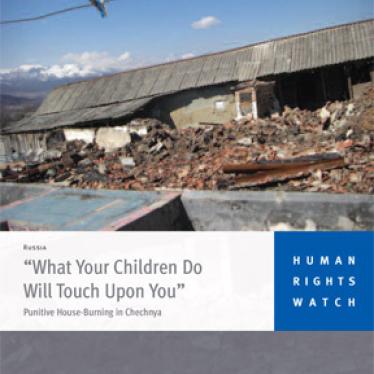(Moscow) - Russian federal and Chechen authorities should immediately put a stop to home burnings and other collective punishment practices against families of alleged insurgents in Chechnya, and ensure meaningful accountability for perpetrators of human rights violations in the region, Human Rights Watch said in a report released today.
The 54-page report, "‘What Your Children Do Will Touch Upon You': Punitive House-Burning in Chechnya," documents a distinct pattern of house burnings by security forces to punish families for the alleged actions of their relatives.
"Russia has said its ‘counterterrorism operation' in Chechnya is over, but human rights violations there certainly aren't," said Tanya Lokshina, deputy director of Human Rights Watch's Russia office. "Burning down peoples' homes for the alleged sins of their families is a criminal tactic, and there is no reason why the government can't put a stop to it and hold the perpetrators accountable."
In 2008, high-level Chechen officials, including President Ramzan Kadyrov, made public statements stating that the families of insurgents should expect to be punished unless they convinced their relatives to surrender. Insurgents have also been using a variety of violent tactics, including house-burning, against members and supporters of the pro-Moscow Chechen authorities.
"The use of appalling and unlawful tactics by rebel fighters does not justify the use of similar tactics by the government forces fighting the insurgency," said Lokshina.
The Human Rights Watch report documents 13 of 26 known cases of punitive home burnings between June 2008 and June 2009 that can be attributed to Chechen law enforcement personnel in eight districts of Chechnya. The most recent known case took place on June 18. The Memorial Human Rights Center, a leading Russian human rights organization working in the North Caucasus, reported that at about 5 a.m. unidentified law enforcement servicemen burned two homes belonging to the elderly parents of an alleged insurgent in the village of Engel-Yurt, Gudermes district.
The punitive home burnings detailed in the Human Rights Watch report generally were carried out at night, with law enforcement personnel - often masked - arriving in several cars, breaking into the yard and forcing the residents out of their house. The attackers would prevent residents from approaching their home, treating them roughly and in some cases holding them at gunpoint. The assailants would then torch the houses methodically and unhurriedly and stay for up to an hour watching the fire spread, to make sure the residents or their neighbors did not try to put it out before the house was well ablaze.
The victims of house burnings were generally told in clear terms that complaining to the authorities would lead to further repercussions. Consequently, victims filed official complaints in only three of the cases known to Human Rights Watch. In another three cases, the victims agreed to have Memorial raise their cases with the authorities. At this writing not a single criminal case into the allegations of house burnings in Chechnya has been opened by the law enforcement authorities.
The Russian government has overwhelmingly failed to investigate and hold accountable perpetrators of human rights violations during a decade of war and counterinsurgency in Chechnya. One Chechen government official told Human Rights Watch that this failure has helped to create in Chechnya an acceptance of impunity as the norm.
"The unpunished assaults on human rights in Chechnya are a perversion of justice and should not be tolerated," said Lokshina. "The perpetrators need to be held accountable."
In more than 100 judgments to date, the European Court of Human Rights has found Russia responsible for serious human rights violations in Chechnya. Human Rights Watch called on the Russian government to ensure that the rulings in these cases are implemented effectively.
"Fully implementing the European Court's judgments is one of the best ways of ending impunity in Chechnya," said Lokshina. "In a climate of accountability, it's hard to imagine crimes like punitive home burnings taking place."







